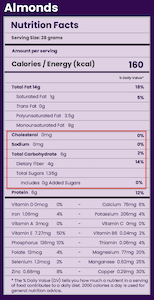Remember your grandma force feeding almonds everyday as a child, and insisting these nuts were important for strength and focus?
According to food science, her advice was spot on. New research confirms that eating nutritious foods such as almonds with good fats, proteins and fibre is the key to optimal health.
Almonds are popular across the globe for a reason, actually many. The health benefits of almonds are amazing. The delicate flavour makes almond a tasty, versatile food and a healthy addition to many dishes.
But are almonds really superfoods they are touted to be?
A recent survey of 4064 participants by IPSOS, an Indian consulting group, revealed that 72% of them snacked on almonds over its apparent health benefits.
But before we look at the health benefits of almonds, let’s see what’s in this fruit seed and its journey to this iconic status.
You thought almond was a nut, didn’t you? Tis actually the stone-like, edible seed of the almond fruit. Related to the peach and apricot family, almond trees are native to west Asia and north Africa and domesticated around 2000 BC in modern day Iran and Jordan.
The state of California is the largest producer and exporter of almonds today, followed by Australia and Iran.
What makes this tiny nut a nutrient powerhouse? What are the health benefits of almonds?
An ancient food referenced in historical texts, almond is rich in proteins, antioxidants, fibre and healthy fats. One serving (28 g or a small handful) provides 161 calories and offers you:
Protein — 6 g
Fibre — 3.5 g
Fat –14 grams (9 g monounsaturated)
Vitamin E –37% of the RDI
Magnesium — 20% of the RDI
Manganese — 32% of the RDI
In addition, almonds contain suitable amounts of vitamin B2, copper and phosphorus.
All these macronutrients, vitamins, minerals play a significant role in keeping you healthy. Let us see the various health benefits of almonds.
Almonds can protect against heart disease
Vitamin E is one important antioxidant that your body needs to remove radical toxins from your cells and prevent molecular damage. Research confirms that adequate intake of this fat-soluble antioxidant can lower your risk of heart disease.
And almonds happen to be one of the best food sources of this vital vitamin.
Almonds reduce bad cholesterol levels and prevent oxidation
LDL lipoproteins (bad cholesterol) levels in your blood has a direct effect on your risk of cardiac ailments. As with blood sugar, diet plays a key role in reducing this risk by lowering LDL levels.
Wondering how this works?
Almonds and other foods rich in antioxidants like flavonoids and vitamin E help maintain adequate levels of HDL lipoproteins (good cholesterol). They also reduce LDL levels, thus keeping your overall lipid levels in check
If that’s not enough, antioxidant in almonds can prevent LDL oxidation and further protect your heart from damage. What’s more; these antioxidants can protect you from certain types of cancer.
As two servings (42 g) of almonds can reduce LDL by almost 5.3 mg, add almonds to daily snacks and other meals.
Almond can regulate blood sugar
Most tree nuts are low in calories but high in protein and fibre. Almond is no exception making it a good choice for the pre-diabetic and diabetic. What makes almonds so efficient at controlling blood sugar spikes?
The answer lies in the high levels of magnesium. This mineral is required in over 300 body functions which includes regulating blood sugar. Interestingly enough, in a focused study, people with Type 2 diabetes (25-40%) were found to be magnesium deficient. When they supplemented their diet with magnesium, it reduced insulin resistance and helped avoid sugar spikes.
Almonds help lower blood pressure
Did you know that magnesium deficiency can cause your blood pressure to shoot up? It doesn’t matter whether you’re obese or weight right. When you address this issue, you’ll notice pressure levels returning to normal.
One way to get enough magnesium is to add almonds to your everyday diet along with other magnesium-rich foods. This can also improve your bone health in the long run.
Almond improves satiety and reduces intake of calorie-rich carbs
Have you noticed you feel full after eating foods like meat, nuts, tofu or legumes?
Protein and fibre are the agents working in the background. As the body takes time to digest these macro nutrients, you end up feeling satiated for longer. This means you eat fewer calories and less of simple (unhealthy) carbs
As almonds contain good amounts of fibre and protein, they can lower your hunger levels and prevent overeating.
Almonds promote healthy eating and nutrients absorption
Fat is no longer the villain of the food world and rightly so. Good fats help your body better absorb certain minerals and vitamins like A and D.
If you need more reasons to munch on those crunchies, here’s one more.
A controlled study of 6802 adults revealed interesting findings. The ones who added almonds to their diet gravitated towards healthier foods. They also reduced their intake of sugary, salty and highly processed foods.
While the exact reason isn’t clear, researchers believe that snacking on nuts reduced the desire to consume high calorie and unhealthy foods.
Almonds promote gut health and digestive system
Along with prebiotics, fibre in almonds can improve your gut health. This makes almonds handy food to stock in your fridge.
Almonds are also alkaline foods and help balance PH levels in the body. This keeps your digestive system healthy and efficient.
Almond improves brain function and reduces anxiety
For improved cognitive ability, you need an important chemical — Phenylalanine. And riboflavin (vitamin B2) and L-carnitine are necessary for the growth of new brain cells.
Almonds boost brain activity and improve focus as they contain all the three chemicals in plenty. Magnesium and other minerals in almonds help alleviate symptoms of anxiety and stress.
Reduce your risk of developing dementia or Alzheimer by consuming almonds in 4-5 times a week.
Almond helps lose weight and belly fat
Almonds, like other nuts, contain nutrients that your body can’t digest easily. This translates to fewer calories (10-15% less) absorbed.
Besides eating almonds can boost metabolic activity. When you combine this with their hunger controlling power, it’s a double advantage for you. You can maintain weight and even lose some in the process.
When you combine almond eating with a low-carb diet, the weight loss effect is nearly doubled compared to a diet filled with complex carbs. The icing on the cake – almonds can contribute to reduced waist girth and belly fat too.
Other health benefits of almond and almond oil
Almonds is considered to be equally beneficial for your skin and hair, thanks to their flavonoid content. While more research is needed to support these claims, the perceived benefits make it worth your while.
Are blanched almonds healthier than almonds with brown skin on?
You’re told to eat almonds without skin on account of phytic acid present. This antioxidant can slightly lower the absorption of iron, calcium and zinc in humans.
But almond skin is home to 20 other antioxidants which reduce inflammation, remove free radicals and improve immunity. Almond with its brown skin on wins hands down over blanched almonds.
Should you forgo these benefits over phytic acid?
If you’re getting enough calcium, zinc and iron from other sources, you’ve covered. If you’re still wary, soak almonds overnight to remove phytic acid from the skin. Throw the water away and munch on the almonds.
Eating almonds is risky for certain people
While you should add almonds to a healthy diet, tree nuts are common allergens. Offering almonds to an allergic person can be dangerous, even prove fatal. You can also develop allergies at any age. If you notice rashes, suffer from vomiting or diarrhoea, or experience discomfort including nausea, breathlessness, itching,and difficulty in swallowing after eating almonds, check with a doctor to rule out a nut allergy.
Don’t offer whole almonds to the elderly, dementia patients and people with Parkinson’s disease. They could choke easily as they’ve difficulty in swallowing certain foods or have poor gag reflex.
What happens when you go overboard with your almond love?
How you consume this nut is as important. If your idea of almond snacking is a cookie, you’re going to add calories along with unwanted sugars and fat.
And eating more than 1-2 handfuls of almonds will add to the calorie count. The key is moderation.
Almond indeed deserves its superfood tag! To stay healthy regularly eat almonds. As you can see, the health benefits of almonds are many. So if almonds are not part of your diet, start them immediately. Your mind and body will thank you.
What’s your favourite way of consuming almonds? Tell us in the comments. We may feature some healthy almond recipes that tickle your taste buds.






